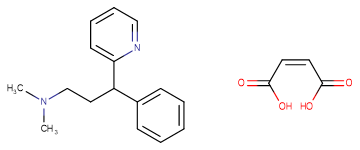
Pheniramine maleate
CAS No. 132-20-7
Pheniramine maleate( —— )
Catalog No. M11301 CAS No. 132-20-7
Pheniramine Maleate is an antihistamine with anticholinergic properties used to treat allergic conditions such as hay fever or urticaria.
Purity : >98% (HPLC)
 COA
COA
 Datasheet
Datasheet
 HNMR
HNMR
 HPLC
HPLC
 MSDS
MSDS
 Handing Instructions
Handing Instructions
| Size | Price / USD | Stock | Quantity |
| 25MG | 27 | In Stock |


|
| 50MG | 34 | In Stock |


|
| 100MG | 45 | In Stock |


|
| 200MG | 54 | In Stock |


|
| 500MG | 84 | In Stock |


|
| 1G | Get Quote | In Stock |


|
Biological Information
-
Product NamePheniramine maleate
-
NoteResearch use only, not for human use.
-
Brief DescriptionPheniramine Maleate is an antihistamine with anticholinergic properties used to treat allergic conditions such as hay fever or urticaria.
-
DescriptionPheniramine Maleate is an antihistamine with anticholinergic properties used to treat allergic conditions such as hay fever or urticaria.(In Vitro):Pheniramine maleate inhibits CYP2D6, the specific P450-isozymes, to delay metabolic time and prolong antihistaminic effects.Pheniramine maleate regulates cellular Ca2+ transmembrane action, and inhibits Ca2+ influx into BC3H-1 cells by inhibiting histamine with an IC50 value of 1.01 mM.Pheniramine maleate (0.5, 1.0 mM; 24 h) induces cell apoptosis in human T-cell acute lymphoblastic leukemia cell lines.Pheniramine maleate (1 μM-1 mM; 12-48 h) inhibits cell proliferation in a time-dependent manner and shows inhibitory concentration IC50s of 550 μM (CCRF-CEM cells) and 420 μM (Jurkat cells), respectively.(In Vivo):Pheniramine maleate (1.75 μM; i.t.) exerts local anesthesia effect and results spinal block in rats.
-
In VitroPheniramine maleate inhibits CYP2D6, the specific P450-isozymes, to delay metabolic time and prolong antihistaminic effects.Pheniramine maleate regulates cellular Ca2+ transmembrane action, and inhibits Ca2+ influx into BC3H-1 cells by inhibiting histamine with an IC50 value of 1.01 mM.Pheniramine maleate (0.5, 1.0 mM; 24 h) induces cell apoptosis in human T-cell acute lymphoblastic leukemia cell lines.Pheniramine maleate (1 μM-1 mM; 12-48 h) inhibits cell proliferation in a time-dependent manner and shows inhibitory concentration IC50s of 550 μM (CCRF-CEM cells) and 420 μM (Jurkat cells), respectively. They are for reference only.Cell Viability AssayCell Line:Human T-cell acute lymphoblastic leukemia cell lines: CCRF-CEM and Jurkat ALL Concentration:0.5, 1.0 mM Incubation Time:24 hours Result:Induced cells apoptosis with chromatin condenses and marginalizes, and nuclear debris spreaded into the cytoplasm.Cell Viability AssayCell Line:Human T-cell acute lymphoblastic leukemia cell lines: CCRF-CEM and Jurkat ALL Concentration:1 μM-1 mM Incubation Time:12, 24, 48 hours Result:Inhibited cell proliferation and survival in a time- and dose-dependent manner.
-
In VivoPheniramine maleate (1.75 μM; i.t.) exerts local anesthesia effect and results spinal block in rats. Animal Model:Sprague–Dawley rats (300-350 g; male) Dosage:0.30, 0.60, 0.90, 1.50, 1.75 μM Administration:Intrathecal injection; one time Result:Resulted the spinal block and displayed dose-dependent effect.Showed 100% blockades in motor function, proprioception, and nociception, with full recoveryduration of action about 41, 56, and 88 min, respectively, at 1.75 μM.
-
Synonyms——
-
PathwayEndocrinology/Hormones
-
Target5-HT Receptor
-
RecptorHT
-
Research AreaInflammation/Immunology
-
Indication——
Chemical Information
-
CAS Number132-20-7
-
Formula Weight356.42
-
Molecular FormulaC16H20N2·C4H4O4
-
Purity>98% (HPLC)
-
SolubilityEthanol: 71 mg/mL (199.2 mM); Water: 71 mg/mL (199.2 mM); DMSO: 71 mg/mL (199.2 mM)
-
SMILESCN(C)CCC(C1=CC=CC=C1)C2=CC=CC=N2.C(=C\C(=O)O)\C(=O)O
-
Chemical Name——
Shipping & Storage Information
-
Storage(-20℃)
-
ShippingWith Ice Pack
-
Stability≥ 2 years
Reference



-
NLX-204 hydrochlorid...
NLX-204 hydrochloride is a potent and selective ERK1/2 phosphorylation-preferring serotonin 5 HT1A receptor agonist(pKi = 10.19).NLX-204, displayed high selectivity in the SafetyScreen44 panel (including hERG channel), high solubility, metabolic stability, and Caco-2 penetration and did not block CYP3A4, CYP2D6 isoenzymes, or P-glycoprotein.
-
Targocil
Targocil is used as a bacteriostatic inhibitor of wall teichoic acid (WTA) biosynthesis which can inhibit the growth of methicillin-susceptible S. aureus (MSSA) and methicillin-resistant S. aureus (MRSA) (MIC90s: 2 μg/ mL) for both MRSA and MSSA.
-
Gepirone
Gepirone HCl is a compound of the azapirone group which is a 5-HT1A receptor agonist belonging to the buspirone family.



 Cart
Cart
 sales@molnova.com
sales@molnova.com


